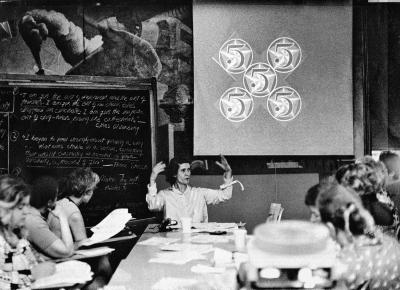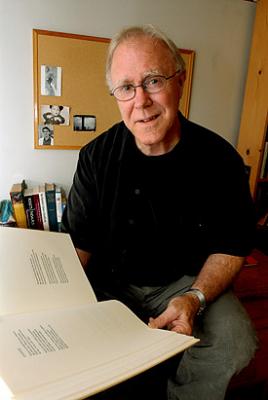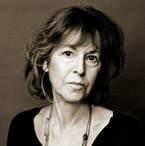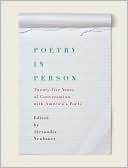“There are few things less pleasing than a writer talking about his own work,” wrote Graham Greene in a letter to a reviewer in 1960. Fortunately, he permitted himself to be unpleasant, otherwise we couldn’t now enjoy the conversational brio of his 1953 Paris Review interview. Although extraneous to the reader’s experience of his work, the dialogue indicates the lengths to which working itself transforms the writer’s experience while exploiting the soundprint of his mind. A capable editor of interview tapes and transcripts succeeds foremost in preserving such rhythms, illuminating the crossing ground where transformations take place.
 “My primary goal was to capture the poets’ voices and habits of thought as faithfully as possible,” writes Alexander Neubauer in his introduction to the twenty-three interviews in Poetry in Person. “In short, poets not only spoke for themselves, they were also allowed to sound like themselves.” His editing is expert – but the provenance of the material is unique to begin with. Pearl London taught a poetry workshop called “Works in Progress” at the New School in Greenwich Village from 1970 to 1998, when she retired. (She died in 2003.) She invited elder poets at the peak of their careers as well as younger stars to bring a poem-in-progress to the workshop for discussion with her students.
“My primary goal was to capture the poets’ voices and habits of thought as faithfully as possible,” writes Alexander Neubauer in his introduction to the twenty-three interviews in Poetry in Person. “In short, poets not only spoke for themselves, they were also allowed to sound like themselves.” His editing is expert – but the provenance of the material is unique to begin with. Pearl London taught a poetry workshop called “Works in Progress” at the New School in Greenwich Village from 1970 to 1998, when she retired. (She died in 2003.) She invited elder poets at the peak of their careers as well as younger stars to bring a poem-in-progress to the workshop for discussion with her students.
 Poets rarely turned her down since “she served in a quiet way as a literary doyenne, if doyenne is still a possible role in this world.” (In a postscript, Robert Polito recalls London’s “persuasive mix of intensity and distraction … Her preparation was part William Empson, part Vince Lombardi.”) Using a small cassette recorder, London taped over 100 discussions. Having recently discovered the 90-minute tapes via London’s son, Neubauer, who taught fiction at the New School in the 1990’s and sat in on several of London’s classes, went to work.
Poets rarely turned her down since “she served in a quiet way as a literary doyenne, if doyenne is still a possible role in this world.” (In a postscript, Robert Polito recalls London’s “persuasive mix of intensity and distraction … Her preparation was part William Empson, part Vince Lombardi.”) Using a small cassette recorder, London taped over 100 discussions. Having recently discovered the 90-minute tapes via London’s son, Neubauer, who taught fiction at the New School in the 1990’s and sat in on several of London’s classes, went to work.
The subjects include Maxine Kumin (1973), Philip Levine (1978), Muriel Rukeyser (1978), James Merrill (1979), June Jordan (1979), Marilyn Hacker (1980), Galway Kinnell (1981), Lucille Clifton (1983), Stanley Plumly (1986), C.K. Williams (1988), Molly Peacock (1992), Charles Simic (1995), and Eamon Grennan (1996). Neubauer’s selections are clearly oriented to the mainstream’s hall of fame.
What exactly can we learn from poets as they gab about their work? In 1977, Robert Hass brought his poem “Meditation at Lagunitas” to London’s workshop. The poem eventually appeared in Praise (1979), his second book. But at that moment, Hass was trying out sounds that differed from Field Guide (1973) and establishing what developed into his sustained voice. Below, he discusses “Songs to Survive the Summer”:
 “Aside from the subject, what’s happening in this poem – it’s a long poem – is the slowness of breath. The spirit, literally the breath of poetry, is in the vowel sounds. It was Allen Ginsberg who told me, and when I said to him, ‘You always say that, what exactly do you mean?’ he sat me down in his lovely, generous way and pulled off the shelf Shelley’s ‘Ode to the West Wind,’ and [Ginsberg’s translation of] ‘The Diamond Sutra.’ And he analyzed the first parts of ‘The Diamond Sutra,’ looking at the pattern of vowel sounds, and showed me they were exactly the pattern of sounds in the beginning of ‘Ode to the West Wind.’ The patterning of vowel sounds, the patterning of breath, is the way a poet actually reaches into and takes over your body while you’re reading and experiencing the poem.”
“Aside from the subject, what’s happening in this poem – it’s a long poem – is the slowness of breath. The spirit, literally the breath of poetry, is in the vowel sounds. It was Allen Ginsberg who told me, and when I said to him, ‘You always say that, what exactly do you mean?’ he sat me down in his lovely, generous way and pulled off the shelf Shelley’s ‘Ode to the West Wind,’ and [Ginsberg’s translation of] ‘The Diamond Sutra.’ And he analyzed the first parts of ‘The Diamond Sutra,’ looking at the pattern of vowel sounds, and showed me they were exactly the pattern of sounds in the beginning of ‘Ode to the West Wind.’ The patterning of vowel sounds, the patterning of breath, is the way a poet actually reaches into and takes over your body while you’re reading and experiencing the poem.”
Aside from the wonderfully instructive anecdote, Hass gives the class a feel for the movement of his own mind during a moment of decisiveness. “What I tried to do was write in longer lines,” he goes on. “And as soon as I did that I used more words and as soon as I used more words I lost control immediately. And I saw that I was involved in this terrific battle with control … The emotions got larger and more unmanageable and I was just happy to get the damn ball across the net by whatever means possible.”
 Although many of these discussions deal with listening for and devising change, the interviews actually expose the rather permanent values of poets – the active conjunction of which may be the dynamic lesson here: the urge for development finding a way to live on decent terms with intractable, entrenched habit. In 1979, Louise Glück visited the class and read “Autumnal,” a poem soon to appear in her third book Descending Figure (1980). The vehemence of her response to London’s remark below underscores an agitated, deep-set preference – as well as a longstanding challenge posed to herself.
Although many of these discussions deal with listening for and devising change, the interviews actually expose the rather permanent values of poets – the active conjunction of which may be the dynamic lesson here: the urge for development finding a way to live on decent terms with intractable, entrenched habit. In 1979, Louise Glück visited the class and read “Autumnal,” a poem soon to appear in her third book Descending Figure (1980). The vehemence of her response to London’s remark below underscores an agitated, deep-set preference – as well as a longstanding challenge posed to herself.
“London: Marvelous poem. You said before that in your work you were moving away from the depersonalized voice. That you wanted terribly to move toward not necessarily more ‘I’ and ‘me’ but toward a greater communication of self, as I understood it. Is that … ? …
Glück: No, no, not communication of the self, that’s not what I want. The issue of ego is a sensitive one. I think that most contemporary poetry is horrifically disfigured by it. The territoriality in most poetry that goes out to claim ‘my pain,’ ‘my father,’ ‘my mother,’ ‘my past.’ There’s a swagger in it that offends me greatly. I would like to write poetry that was intensely personal and seemed absolutely devoid of egotism.”
Other dialogues are more relaxed and rambling, such as Edward Hirsch’s 1993 interview which centers on “Wild Gratitude.” Frank Bidart’s chapter (“Confessional,” 1994) is one of the most personal discussions: “People fail each other. People do not do what they want to do for each other, because we constantly feel contradictions.” June Jordan (1979) complained about the cover of her Selected Poems:
 “My editor for the book was Toni Morrison, and I said, ‘Toni, this is cheap, this is offensive.’ She said to me, ‘Poetry doesn’t sell. The publishing house feels it’s doing a poet a favor to publish poetry at all. And if you’re not going to cooperate with what they think is making is marketable, then we’re just not going to do it.’”
“My editor for the book was Toni Morrison, and I said, ‘Toni, this is cheap, this is offensive.’ She said to me, ‘Poetry doesn’t sell. The publishing house feels it’s doing a poet a favor to publish poetry at all. And if you’re not going to cooperate with what they think is making is marketable, then we’re just not going to do it.’”
London quotes Eliot, “When a poet’s mind is perfectly equipped for its work, it is constantly amalgamating disparate experience.” Robert Pinsky’s response below (“The Want Bone,” 2008) glosses his “civic” stance – and also clues us into the integrative strangeness of his voice and his singular rhetoric, mentality and style:
 “This country’s genius has to do with mixing. I am a mix, you are a mix. I would like to write works of art that include the vocabulary and the idiom and the manner of speaking that I grew up with in a – what you could almost call a less-than-working-class neighborhood … I would like to include that but not stylize my speech … I would like to include also the fact that I have a Ph.D., and I have read a good many books, and I have a lot of very smart friends … I would like to include also the part of me that watches television and the part of me that reads John Donne.”
“This country’s genius has to do with mixing. I am a mix, you are a mix. I would like to write works of art that include the vocabulary and the idiom and the manner of speaking that I grew up with in a – what you could almost call a less-than-working-class neighborhood … I would like to include that but not stylize my speech … I would like to include also the fact that I have a Ph.D., and I have read a good many books, and I have a lot of very smart friends … I would like to include also the part of me that watches television and the part of me that reads John Donne.”
 In his 1994 interview about the shaping of “My Father’s Body,” William Matthews says, “Well, these decisions are intuitive. Afterwards when you talk about them you sound as if you’re more knowledgeable about your own procedures than you actually are … A lot of these decisions are made at the muscle level.” The best parts of the dialogues in Poetry in Person recapture the swift certainties of intuition. I hope Alexander Neubauer will consider bringing out another group of his edited interviews – if he finds that the remaining cache of tapes with Robert Creeley, Mark Strand, W.S. Merwin and others may hold up as well as those in this valuable collection.
In his 1994 interview about the shaping of “My Father’s Body,” William Matthews says, “Well, these decisions are intuitive. Afterwards when you talk about them you sound as if you’re more knowledgeable about your own procedures than you actually are … A lot of these decisions are made at the muscle level.” The best parts of the dialogues in Poetry in Person recapture the swift certainties of intuition. I hope Alexander Neubauer will consider bringing out another group of his edited interviews – if he finds that the remaining cache of tapes with Robert Creeley, Mark Strand, W.S. Merwin and others may hold up as well as those in this valuable collection.
[Published by A.A. Knopf on March 18, 2010. 345 pages, $27.95 hardcover. Includes photographs of the poets and images of the drafts of poems in discussion.]